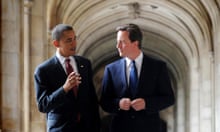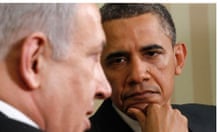Binyamin Netanyahu has repeated his assertion that there can be no return to Israel's "indefensible" 1967 borders.
The Israeli prime minister made his pledge in an address on Monday to thousands of pro-Israel American Jews and US lawmakers in Washington, and promised to present his vision for an Israeli-Palestinian peace agreement in a speech to Congress on Tuesday.
His speech, which drew cheers and standing ovations, came amid pressure from the Obama administration for him to do more to renew stalled Middle East peace efforts.
The warm reception he enjoyed at the gala dinner of the American Israel Public Affairs Committee (Aipac) contrasted with the contentious tone of some of his recent exchanges with Barack Obama over border issues.
Netanyahu planned address on Tuesday to a joint meeting of Congress, where Israel enjoys strong bipartisan support, could similarly remind Obama, before the 2012 presidential race, of the political price he might have to pay if he tries to push the Israelis too hard.
In that speech, Netanyahu said, he would "outline a vision for a secure Israeli-Palestinian peace", but promised he would also "speak the unvarnished truth".
"This conflict has raged for 100 years because the Palestinians refuse to end it. They refuse to accept a Jewish state," Netanyahu said.
A peace agreement, he said, must assure Israel's security.
"Israel cannot return to the indefensible 1967 borders," he continued, rekindling the dispute with Obama in a possible effort to placate territorial hardliners in the Israeli government.
The border issue took prominence last week when Obama, in a major foreign policy speech, took the position that any negotiations on final borders of the Jewish and Palestinian states must be based on the boundaries existing before the 1967 war in which Israel captured east Jerusalem, the West Bank and the Gaza Strip – lands the Palestinians claim for their hoped-for state.
In direct statements and through aides, Netanyahu suggested that Obama did not understand Israel's security needs or the realities of the region.
Obama said clearly in his policy speech, and in his own address to Aipac on Sunday, that the territorial markers could be adjusted through mutually agreed land swaps – a principle accepted by the Palestinians that would allow Israel to retain major settlement blocs and assure its security.
But Netanyahu has repeatedly sidelined this part of the Obama message.
In a sign of the sympathy Netanyahu can hope to enjoy when he speaks to Congress, a key Obama political ally, the Senate majority leader, Harry Reid, challenged the president on the border issue at the Aipac dinner.
"No one should set premature parameters about borders, about building or about anything else," Reid said.
The reference to building alluded to earlier US demands that Israel renew an expired moratorium on settlement construction in lands claimed by the Palestinians for their future state.
Israeli-Palestinian peacemaking talks stalled in late 2008, shortly before Obama and Netanyahu took office. Obama had hoped to bring the two sides back to the negotiating table and wrest a deal by September 2011. But those efforts foundered after Israel refused to extend a settlement construction slowdown and Palestinians abandoned negotiations after three weeks, saying continued Israeli building on land they want for a future state did not show good faith.
Now, the Palestinians are refocusing their strategy on trying to obtain a unilateral declaration of statehood at the UN when the general assembly meets in September. Israel would like to derail that campaign which, if successful as expected, could compound its diplomatic isolation.
The US also opposes unilateral action, which would put Washington in the awkward position of having to vote against Palestinian statehood at a time when calls for greater democracy are ringing out across the Arab world.
Further complicating peace efforts is a unity deal between rival Palestinian factions that would co-opt the anti-Israel Hamas into the Palestinian government.
Obama has said Israel should not be expected to negotiate with a government that does not recognise its right to exist.
Anti-Israel hecklers interrupted Netanyahu's speech several times, but supporters drowned them out, leaping to their feet, giving him a standing ovation and at one point chanting his nickname, "Bibi, Bibi", and pumping their arms in the air.

